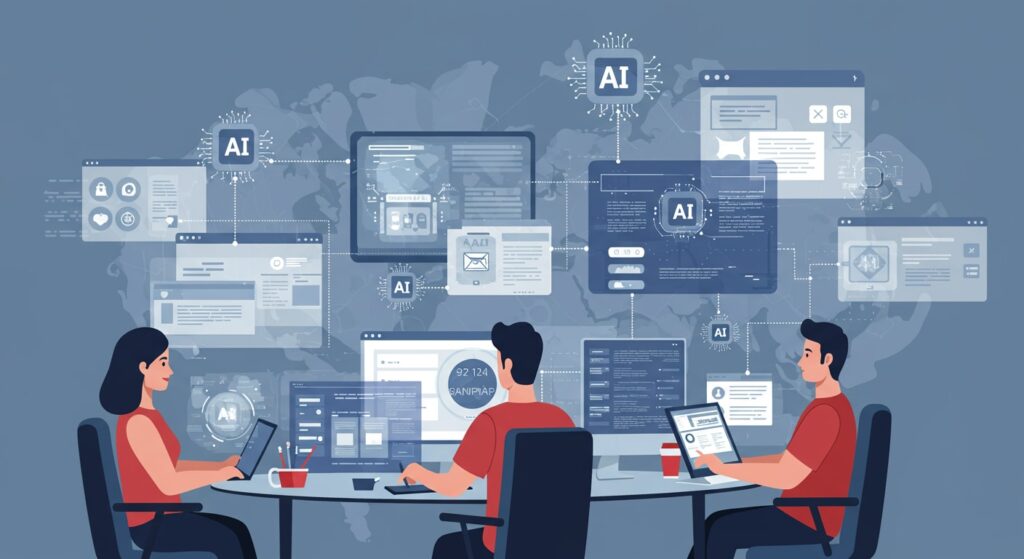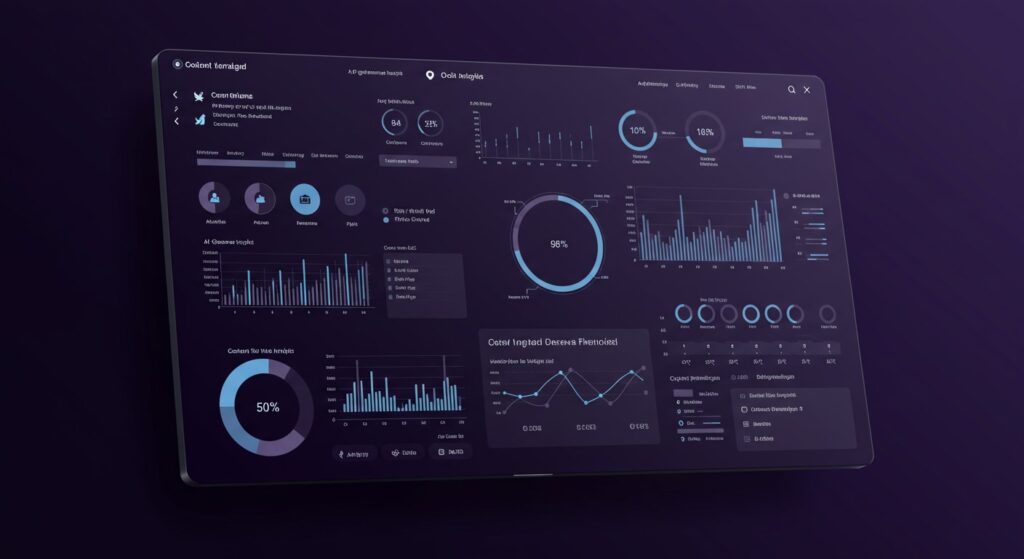Rather than a future concept, an AI-driven content strategy is a current imperative. As marketing teams face increasing pressure to create content at scale, across multiple channels, and tailored to ever-changing user preferences, artificial intelligence is stepping in to streamline the content marketing process.
From generating content ideas to optimizing long-form content and social media posts, AI-powered tools are helping brands move faster without compromising quality or brand identity. Companies that fully integrate AI into their marketing workflows see a 15–20% increase in ROI, highlighting the growing value of AI-powered content strategies across industries.
Organizations can unlock valuable insights through AI-powered analytics and natural language processing that allow marketers to create more relevant content for their target audience. AI content creation tools can help teams write SEO-friendly blog posts, analyze content gaps, and generate engaging social media captions with natural language generation, enabling a more intelligent, responsive approach.
By leveraging machine learning and advanced algorithms, marketers can better understand audience sentiment, discover what’s driving engagement, and optimize content for better search engine visibility.
How an AI-Driven Content Strategy Transforms the Modern Marketing Workflow
Implementing an AI-driven content strategy fundamentally reshapes how teams operate. Rather than relying solely on manual processes and assumptions, AI empowers marketing teams to make faster, smarter, and more data-driven decisions throughout the entire content creation process.
From planning to execution, AI helps streamline repetitive tasks, automate content tagging and classification, and surface actionable insights that inform smarter content planning. Marketers can shift their focus from tactical execution to strategic growth.
AI tools bring agility to workflows that were traditionally linear and siloed. For example, marketers can now use AI-powered analytics to analyze data from previous campaigns and user behavior to inform future content calendars in real time. Insights help identify content gaps, align with industry trends, and guide which formats and channels to prioritize based on audience preferences.
The result is a more responsive, adaptive content engine that can efficiently create content aligned with business goals while preserving consistency in brand voice and elevating the overall content marketing strategy.
The Role of AI-Powered Content Creation in Scaling Output
As content demands continue to grow across multiple platforms, traditional workflows are often too slow and resource-heavy to keep up. AI-powered content creation enables marketing teams to scale production without sacrificing creativity or quality. By leveraging AI tools designed to streamline ideation, drafting, and editing, marketers can maintain a steady flow of high-quality content across formats like blog posts, social media, ad copy, and video scripts.

Accelerating Content Generation Without Sacrificing Quality
AI content creation tools use natural language generation and machine learning to assist with drafting everything from long-form content to social media captions. Rather than starting from scratch, marketers can input a brief or prompt and receive a working draft in seconds, speeding up the content creation process and freeing time for refinement.
For example, a marketing manager could quickly produce a blog outline and intro paragraph and then tailor it with human creativity to better reflect the brand’s voice.
Experts recommend using AI as a co-creator rather than a replacement. Forbes predicts that by 2026, 80% of creative professionals will use AI writing tools to support some stage of content development. The key is to treat AI as a strategic assistant that helps you scale with precision, especially during high-volume campaigns or short turnaround projects.
Automating Content Ideation with AI
One of the biggest hurdles in content marketing is consistently generating fresh, relevant content ideas. AI tools address this by scanning search engine trends, monitoring social media trends, and analyzing user preferences to surface timely, data-informed topics. Whether it’s finding new angles on evergreen themes or identifying underused keywords through SEO research, AI can uncover ideas that might otherwise be overlooked.
Let’s say a brand wants to launch a content campaign for a seasonal product. AI-powered systems can analyze historical performance, current audience behavior, and competitor content to recommend a mix of blog articles, social media posts, and video scripts most likely to resonate. You can reduce creative fatigue and ensure your content marketing efforts remain aligned with real-time audience interests.
Maintaining Brand Voice in AI-Generated Content
One of the most common concerns with AI-generated content is whether it can truly reflect a company’s unique brand voice. Consistency in tone, language, and style is critical across all content marketing touchpoints to build trust and reinforce identity. While AI tools offer speed and efficiency, maintaining human oversight and strategic input ensures the final output feels cohesive and on-brand.
Training AI to Reflect Your Brand’s Tone and Messaging
AI content tools can be customized to understand and replicate your organization’s tone by training them with existing content, brand guidelines, and sample language.
The system learns preferred terminology, sentence structure, and even pacing, essential for staying consistent across multiple channels. For example, if your brand tone is witty and conversational, you can feed the AI examples of prior social media posts or ad copy that reflect that voice.
Fine-tuning inputs and prompt engineering are also key. Marketing teams can build internal style sheets or prompt libraries that guide AI-powered content creation tools more effectively. When used correctly, these tools act more like trained content collaborators than generic generators.
Reducing Risk in AI Copywriting
While AI can generate drafts quickly, unreviewed content can occasionally stray from messaging goals or compliance requirements, especially in regulated industries. A strong review and approval workflow remains essential. Pairing AI writing tools with editorial guardrails helps ensure content meets legal standards, aligns with ethical guidelines, and protects brand identity.
It’s also helpful to set up layers of accountability. For instance, a content strategist can review AI-drafted assets using a checklist that evaluates audience engagement potential, factual accuracy, and tone. By balancing the speed of AI with strategic human checks, you reduce brand risk while maintaining the creative integrity of your AI-powered content strategy.
Unlocking Audience Insights Through Artificial Intelligence
Understanding your target audience has always been a cornerstone of effective content marketing, but AI-powered tools are making it easier to gain a deeper, more dynamic view of who your audience really is.
Instead of relying on static personas or outdated data, marketers can now tap into real-time audience insights generated through machine learning and AI-powered analytics. These insights help shape more personalized, relevant, and high-performing content across every stage of marketing.

Data-Driven Persona Development
Artificial intelligence can synthesize data from a wide variety of sources, like CRM systems, website behavior, social interactions, and third-party platforms, to uncover patterns in user behavior. Marketers can build and continuously refine personas based on actual engagement, not assumptions.
For example, an AI system might detect that a segment of users consistently interacts with visual content but ignores long-form blog articles, prompting a shift toward image creation and short-form social media posts.
AI also identifies audience preferences across demographics, buying stages, and emotional responses by analyzing audience sentiment and behavioral signals. With these insights, marketers can create campaigns that speak directly to the motivations and expectations of each audience segment, dramatically increasing the likelihood of conversion.
Real-Time Feedback Loops and Optimization
AI also learns from audiences. As campaigns roll out, advanced algorithms analyze engagement data to identify what content resonates and what falls flat. These AI-generated analytics enable real-time content adjustments, such as tweaking a blog title to improve CTR or changing the tone of social media captions based on performance.
For instance, if a piece of long-form content underperforms with a specific demographic, AI can flag the issue, recommend alternative formats, and suggest rephrased messaging. This creates a closed feedback loop where every piece of content fuels smarter decisions for the next. It’s a shift from static publishing to a living, learning content generation model—one where your AI-powered content strategy continuously evolves alongside your audience.
AI-Powered Content Strategy for Smarter Distribution
Creating engaging content is only part of the equation. Ensuring it reaches the right people at the right time is just as important. An AI-driven content strategy enables smarter, more efficient content distribution by analyzing audience behaviors, optimizing delivery timing, and tailoring content formats across multiple platforms. With AI-powered tools, marketers can eliminate guesswork and distribute content with precision, increasing both reach and relevance.
Orchestrating Omnichannel Delivery
Audiences move seamlessly between channels, such as email, social, web, and mobile, expecting consistent, tailored experiences. AI can help orchestrate content delivery across multiple channels by determining the best formats, publishing times, and messaging styles for each platform.
For example, AI tools might recommend shorter, visual-first assets for Instagram while scheduling in-depth blog posts or video scripts for LinkedIn based on past engagement trends.
AI also improves social media scheduling by analyzing when your audience is most active and what types of content drive audience engagement. Your content is delivered efficiently and optimized for the nuances of each channel, driving stronger results without additional manual effort.
Dynamic Content Delivery Based on Context
AI elevates personalization by adapting content based on user-specific data such as device, location, browsing history, or recent interactions. For instance, a returning website visitor might receive a different piece of relevant content than a first-time user, improving both user experience and conversion potential. Dynamic delivery is made possible by combining AI-generated analytics with natural language processing to understand user context and deliver content accordingly.
By leveraging deep audience insights, marketing teams can create flexible content templates that update dynamically, whether creating social media posts, customizing email copy, or recommending content based on prior activity. While improving engagement, AI supports more agile, responsive content marketing efforts that align with user expectations in real time.
Future-Proofing Your Content Operation with AI
Marketing teams must think beyond quick wins and invest in scalable, sustainable strategies. A well-executed AI-driven content strategy sets the foundation for long-term innovation, agility, and growth. By building an integrated AI ecosystem and preparing your team for evolving technology, you ensure your content marketing process remains competitive amid shifting audience preferences and emerging industry trends.
Building an AI-Powered Marketing Ecosystem
To future-proof content operations, organizations must go beyond standalone tools and focus on creating a connected, AI-enabled ecosystem. This means integrating AI-powered content creation platforms with existing CMS, DAM, analytics, and social media scheduling tools to ensure data flows seamlessly and content decisions are made with valuable insights at their core.
For example, a team might use AI-powered analytics to track performance metrics across multiple platforms, feed that data into a central hub, and automatically trigger updates to underperforming content. Intelligent orchestration ensures content stays aligned with business goals while continually adapting to real-time user feedback.
Preparing Teams for an AI-First Content World
As AI reshapes roles across the content lifecycle, teams must be upskilled to effectively work alongside AI tools. This includes training content creators on prompt engineering, teaching strategists how to interpret AI-generated analytics, and encouraging collaborative workflows that blend human creativity with automation.
Change management is key. By fostering a culture of experimentation, providing clear governance, and celebrating small wins, organizations can reduce resistance and accelerate AI adoption. Ultimately, preparing your team for an AI-first mindset will help unlock new efficiencies, improve audience engagement, and ensure your brand continues to deliver relevant content.

Moving From Hype to Execution
AI is a transformative force reshaping how we ideate, create, and distribute content. AI-driven content strategies empower teams to deliver more personalized, high-impact content at scale while optimizing resources and deepening audience connections. From accelerating content generation and filling content gaps to unlocking real-time audience insights and orchestrating smarter content distribution, AI is the engine driving next-generation marketing success.
At Aprimo, we understand the real power of combining automation with human creativity. That’s why we’ve built a platform that not only supports AI-powered content creation but also integrates seamlessly with your broader content marketing strategy from planning and production to performance and personalization. With intelligent workflows, robust brand voice governance, and deep analytics built in, we give marketing teams the tools to move faster, stay consistent, and deliver results. Request a demo today to future-proof your content operations and unlock the full potential of AI.


